This article was originally published in June 2017. Following the Disney acquisition of Fox in a $52 billion mega-deal, we've republished this to take another look at what Fox could do with its games business, which can now include Disney IP and perhaps make more use of the X-Men franchise.
Original article: Fox Entertainment Group made its interest in the gaming space explicit in January 2017, when it established its own video game division FoxNext.
And mobile is evidently a big part of those plans, with FoxNext recently acquiring Aftershock, a company that was spun-off as part of Kabam's break-up comprising Los Angeles and San Francisco-based studios.
Fox owns some of the biggest entertainment properties in the world, and has previously licensed its IP to mobile game developers such as Kongregate, Jam City and Wooga.
Next steps
With FoxNext, there's potential for the firm to centralise its efforts without solely relying on external companies. But what has convinced Fox that such a move would be worthwhile?
Fox realised the power of aligning its biggest brands with free-to-play mobile games a long time ago, teaming up with EA to launch The Simpsons: Tapped Out in February 2012.
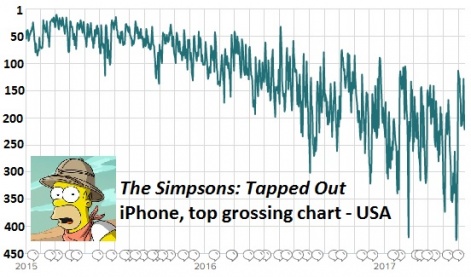
This remains one of its most evergreeen mobile successes, still rarely ranking below 200th in the US iPhone top grossing charts and sitting at 129th as of June 11th 2017.
Family Guy: The Quest for Stuff remains in the top 200 more than three years after launch.
But then, this success was perhaps unsurprising, given that it leveraged one of Fox's best-known IPs and launched in a much less crowded mobile market than today.
More stuff
TinyCo, now part of Jam City, tried to repeat EA's trick with a different Fox IP in 2014 by launching Family Guy: The Quest for Stuff.
It was another hit, largely staying within the top 50 on the US iPhone top grossing charts for its first year and ranking at 187th on June 12th - more than three years after its launch.
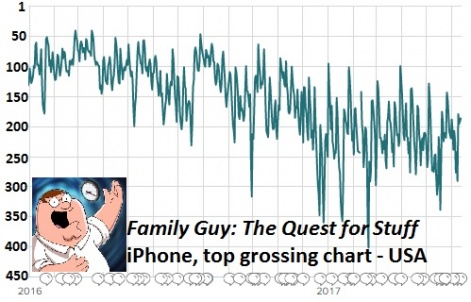
And in April 2017, with the city-builder Quest for Stuff still doing the business, Jam City sought to use its match-three expertise - as shown with F2P hits like Panda Pop - to launch another Family Guy-based hit.
Subtitled Another Freakin' Mobile Game, it's yet to hit the heights enjoyed by The Simpsons: Tapped Out and Family Guy: The Quest for Stuff.
But it's early days for the game, which has ranked just outside the top 100 US iPhone grossing positions throughout May and June so far.
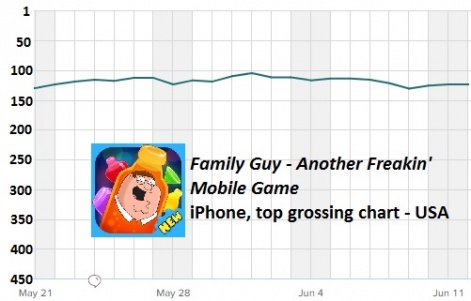
There's time for Another Freakin' Mobile Game to break into the top 100, but even if it doesn't, it already looks to be a steady performer for Jam City.
Not all rosy
This is more than can be said for Wooga's dalliance with Fox IP.
The Quest for Stuff ranked higher in a month than Game of Drones managed in a year.
The German studio launched Futurama: Game of Drones in November 2015 with a rather similar pitch to Jam City's Another Freakin' Mobile Game.
Indeed, this was a matching puzzler - albeit one based on matching four items, rather than the traditional three - that relied heavily on the personality of a fan-favourite animated series for its appeal.
But Jam City's effort has ranked higher in one and half months than Game of Drones has managed in more than one and a half years, with the game making only intermittent appearances on the iPhone US top grossing chart.
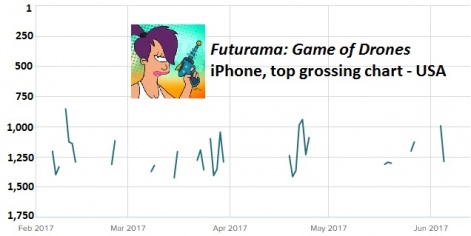
Its most recent appearance was on June 5th, when it hit 1,292nd.
However, this may be down to the fact that Futurama and Family Guy are simply not comparable properties in terms of popularity.
Fox's roster runs the gamut from truly mainstream to slightly more niche.
After all, while the former retains a loyal core following, the TV series has effectively been cancelled on two separate occasions - first in 2003 and then, after beginning a second run in 2010, again in 2013.
A mixed bag
Fox's roster includes animated comedy brands that run the gamut from truly mainstream to slightly more niche, which is something it celebrated in 2016 with the launch of Animation Throwdown: The Quest for Cards.
The result of a deal with Kongregate, the CCG brought together characters from American Dad!, Bob’s Burgers, Family Guy, Futurama and King of the Hill.
And fans of these various shows seemingly responded, with the game remaining steady in the US iPhone top grossing charts at around 200th position for seven months.
It's never been inside the top 100, but you can't fault Animation Throwdown's consistency; its all-time peak was 132nd on November 5th 2016, and on June 9th 2017 it recorded a position of 162nd.
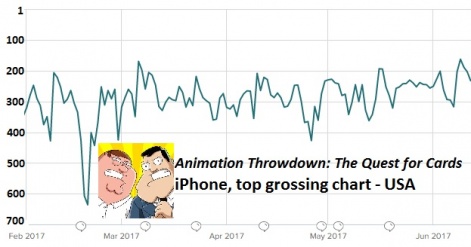
Animation Throwdown may not be the most successful of games to license Fox IP, but it is the one that best shows the potential of FoxNext's vision.
It shows the depth of IP that FoxNext has to draw upon. Add to this the pedigree of former Kabam studios, and FoxNext begins to look like an entity that can make serious waves in the mobile games industry.
Blockbuster
Then there's the diversity of Fox's IP to consider.
Fox brands have a solid track record of translating into successful mobile games.
This piece has focused on its animated comedy brands, but the firm also has a significant footprint in the movie industry.
An MMO strategy title based on Fox property Avatar was in the works at Aftershock before the acquisition, and development will continue under FoxNext's stewardship.
The potential of that game was in part what resulted in FoxNext's decision to acquire the studio.
Either way, Fox's involvement in mobile games is no new thing - and on this evidence, its brands have a solid track record of translating into successful mobile games.
If FoxNext can continue that in a dedicated division that makes games its primary focus, big things will surely follow.






















